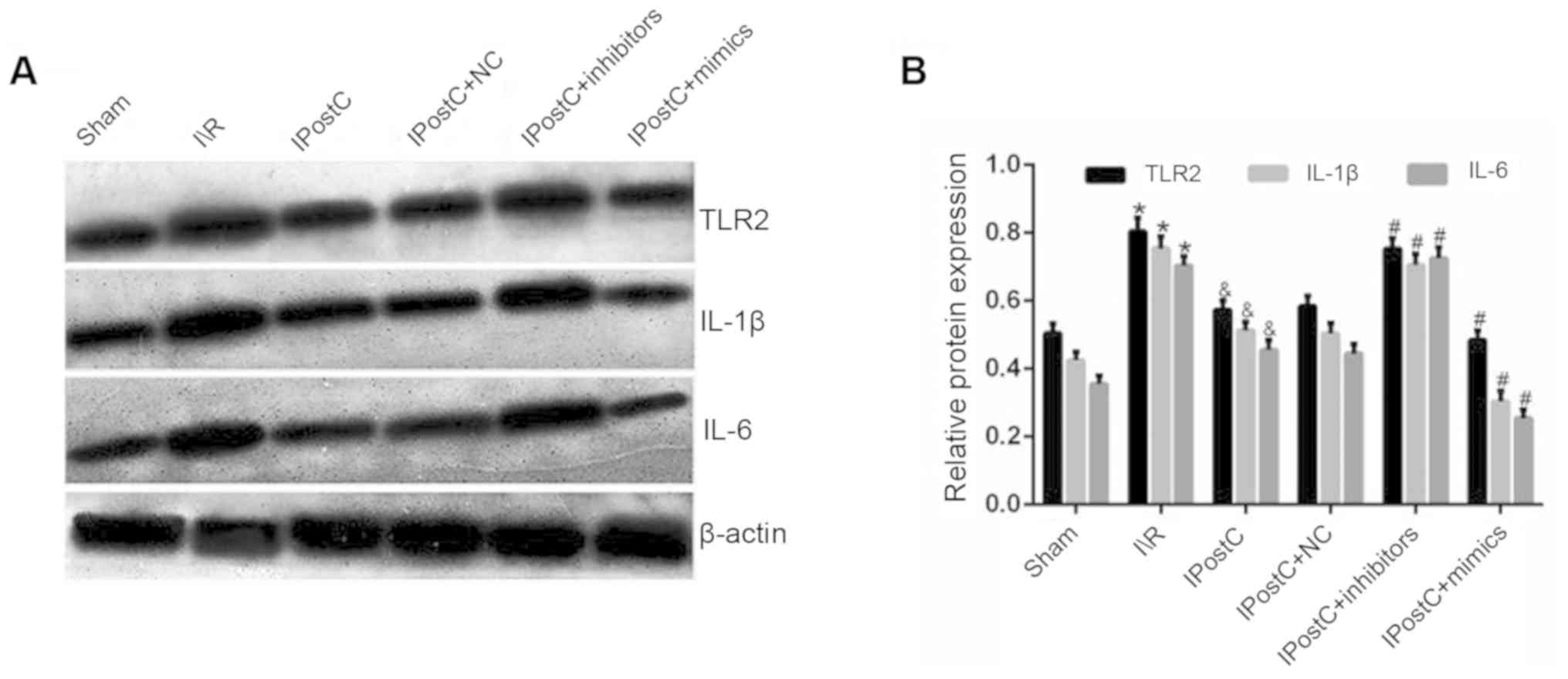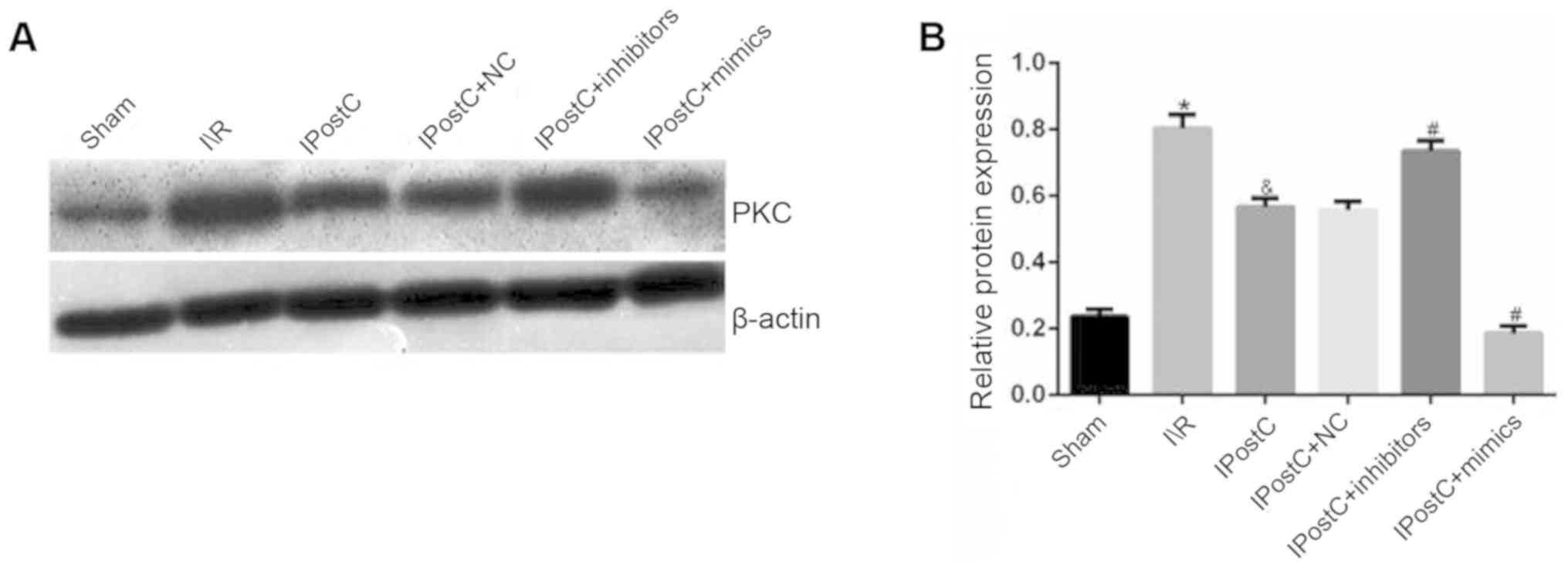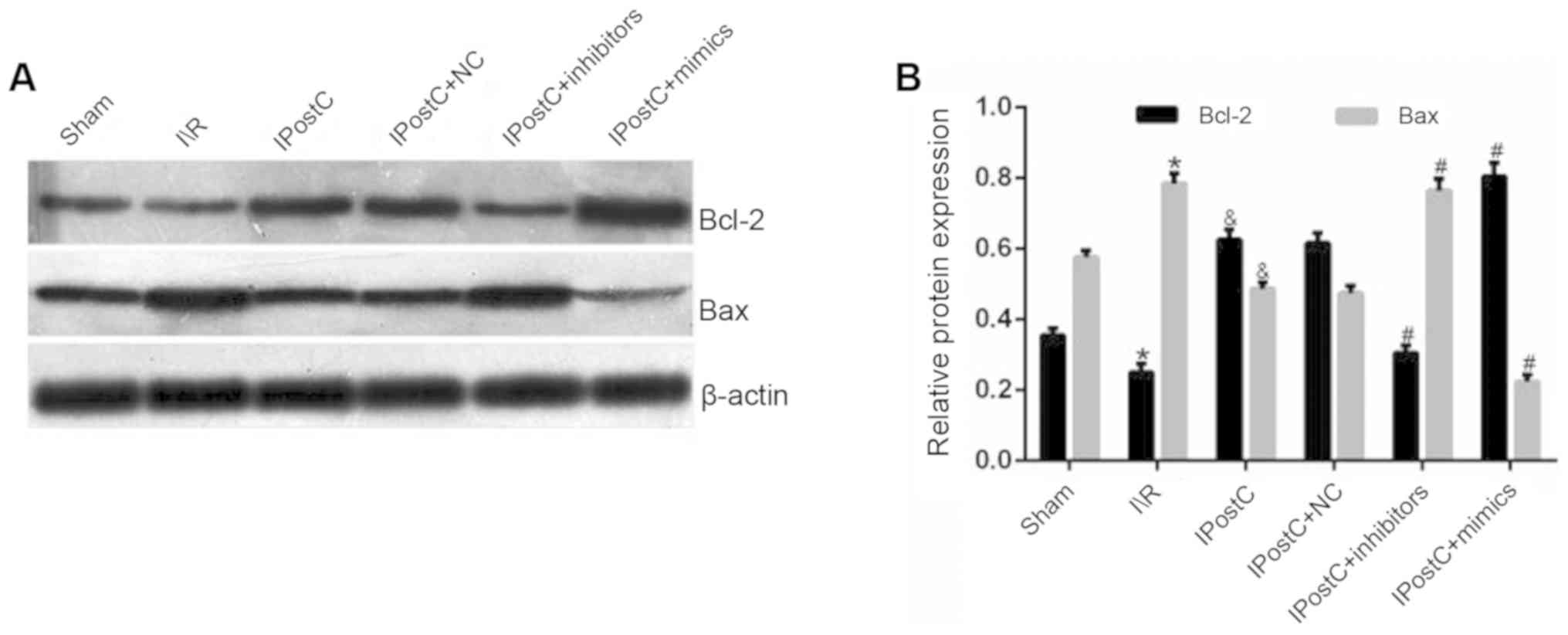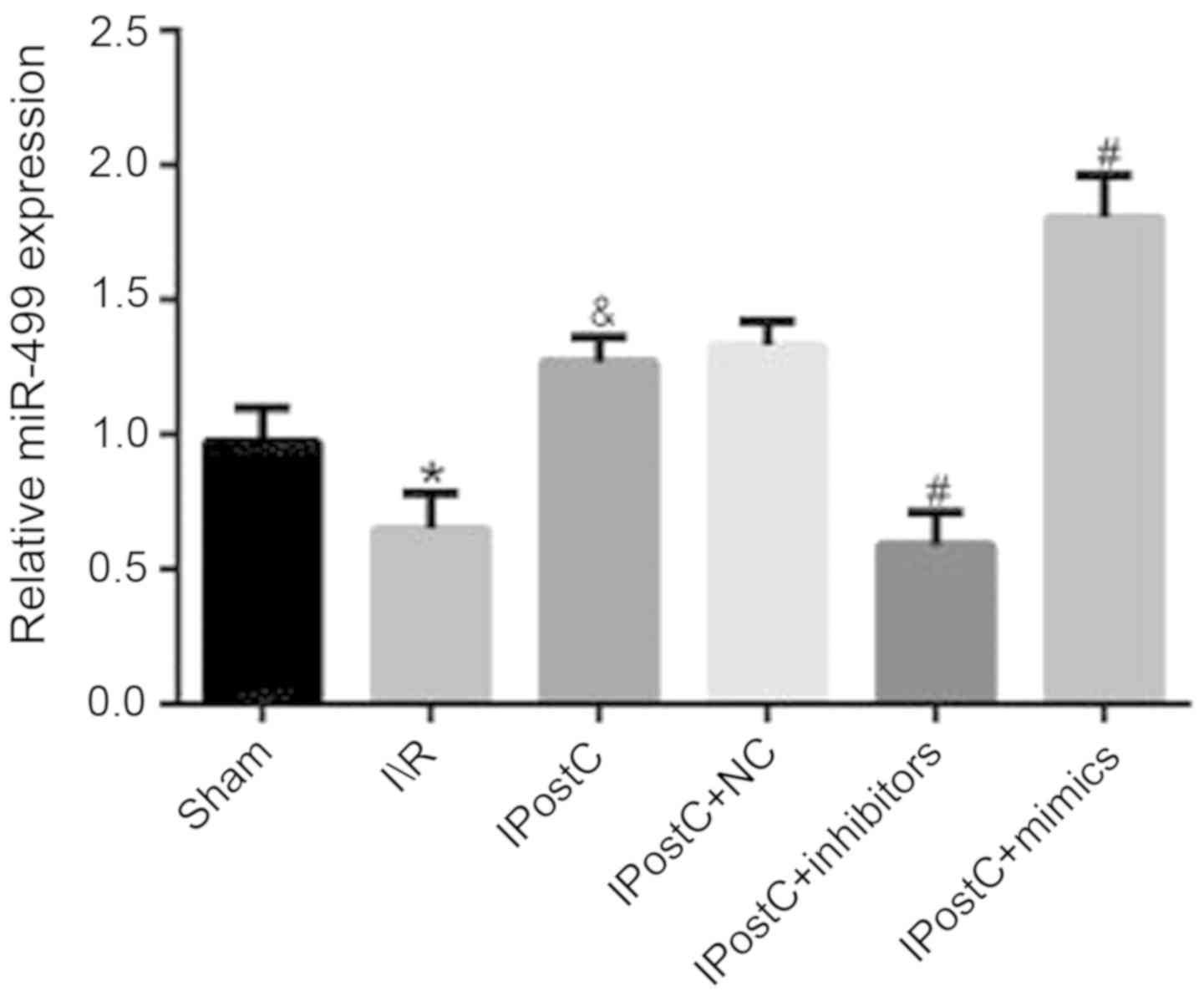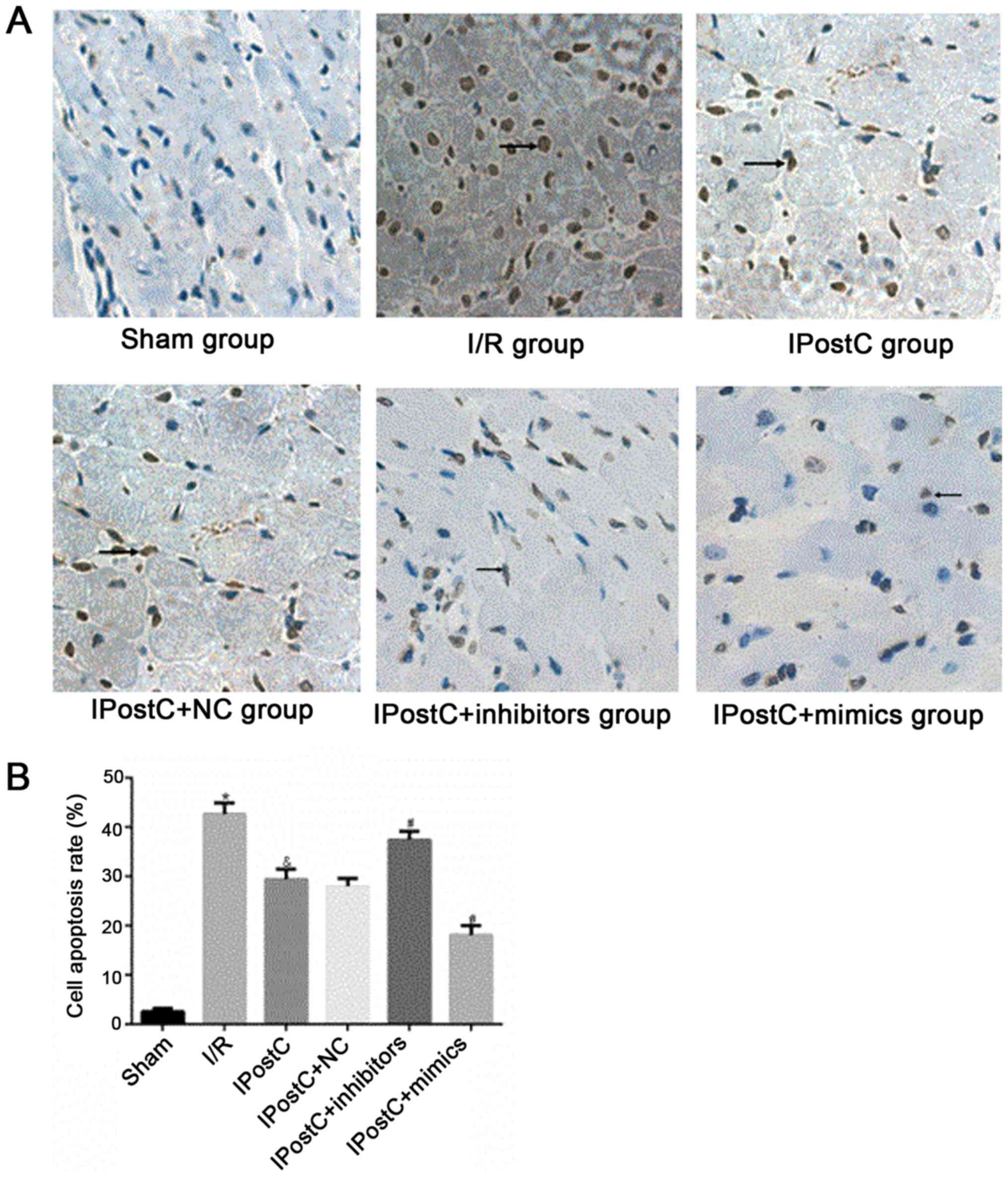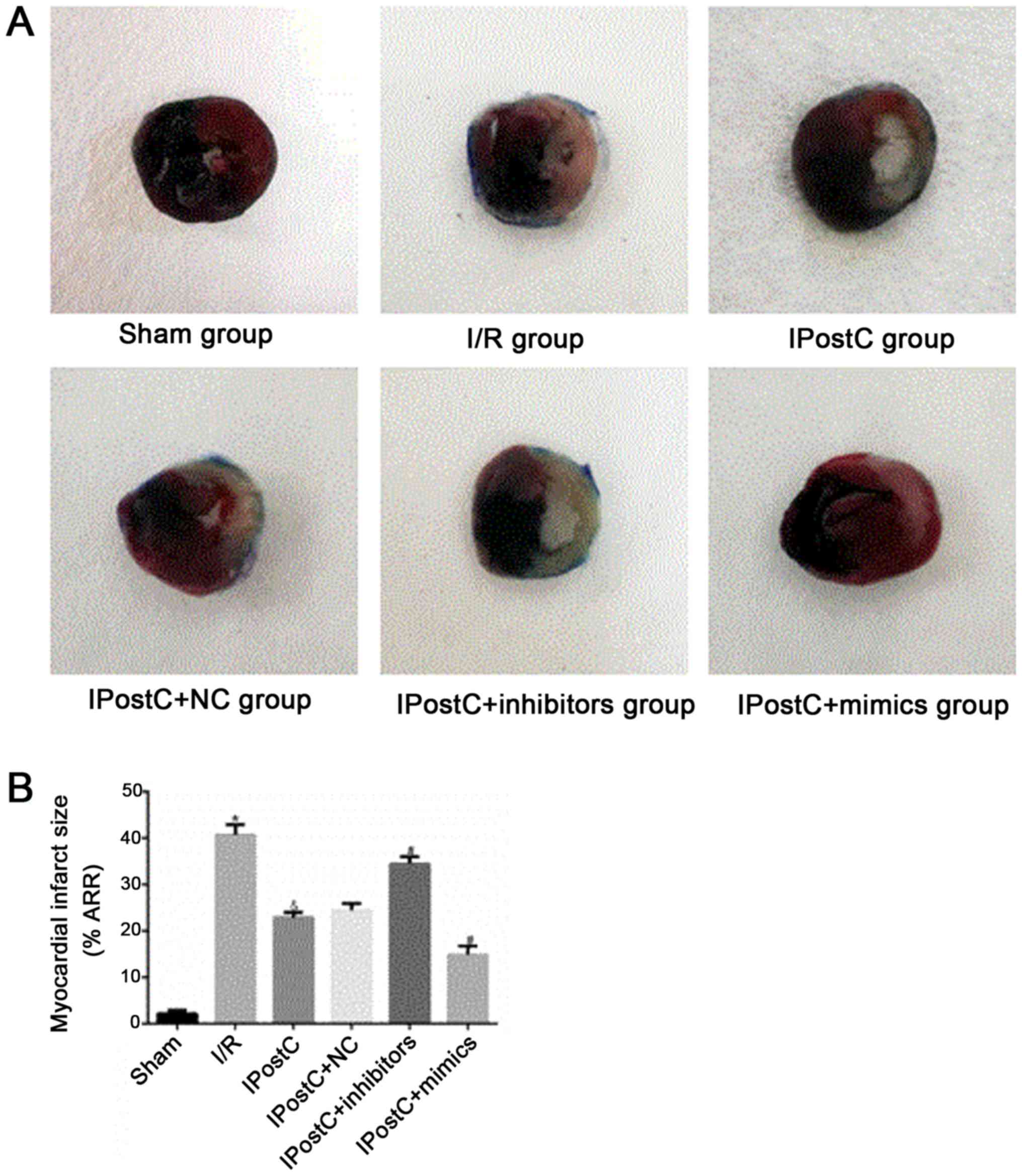|
1
|
Turer AT and Hill JA: Pathogenesis of
myocardial ischemia-reperfusion injury and rationale for therapy.
Am J Cardiol. 106:360–368. 2010. View Article : Google Scholar : PubMed/NCBI
|
|
2
|
Hausenloy DJ, Botker HE, Engstrom T,
Erlinge D, Heusch G, Ibanez B, Kloner RA, Ovize M, Yellon DM and
Garcia-Dorado D: Targeting reperfusion injury in patients with
ST-segment elevation myocardial infarction: Trials and
tribulations. Eur Heart J. 38:935–941. 2017.PubMed/NCBI
|
|
3
|
Yang Y, Yang J, Liu XW, Ding JW, Li S, Guo
X, Yang CJ, Fan ZX, Wang HB, Li Q, et al: Down-Regulation of
miR-327 alleviates ischemia/reperfusion-induced myocardial damage
by targeting RP105. Cell Physiol Biochem. 49:1049–1063. 2018.
View Article : Google Scholar : PubMed/NCBI
|
|
4
|
Pope MR and Fleming SD: TLR2 modulates
antibodies required for intestinal ischemia/reperfusion-induced
damage and inflammation. J Immunol. 194:1190–1198. 2015. View Article : Google Scholar : PubMed/NCBI
|
|
5
|
Arslan F, Keogh B, Mcguirk P and Parker
AE: TLR2 and TLR4 in ischemia reperfusion injury. Mediators
Inflamm. 2010:7042022010. View Article : Google Scholar : PubMed/NCBI
|
|
6
|
Chen E, Bakr MM, Firth N and Love RM:
Inflammatory cell expression of Toll-like receptor-2 (TLR2) within
refractory periapical granuloma. F1000Res. 7:18192018. View Article : Google Scholar : PubMed/NCBI
|
|
7
|
Ward JR, Wilson HL, Francis SE, Crossman
DC and Sabroe I: Translational mini-review series on immunology of
vascular disease: Inflammation, infections and Toll-like receptors
in cardiovascular disease. Clin Exp Immunol. 156:386–394. 2009.
View Article : Google Scholar : PubMed/NCBI
|
|
8
|
Ha T, Hu Y, Liu L, Lu C, McMullen JR,
Kelley J, Kao RL, Williams DL, Gao X and Li C: TLR2 ligands induce
cardioprotection against ischaemia/reperfusion injury through a
PI3K/Akt-dependent mechanism. Cardiovasc Res. 87:694–703. 2010.
View Article : Google Scholar : PubMed/NCBI
|
|
9
|
Arslan F, Houtgraaf JH, Keogh B, Kazemi K,
de Jong R, McCormack WJ, O'Neill LA, McGuirk P, Timmers L, Smeets
MB, et al: Treatment with OPN-305, a humanized anti-toll-like
receptor-2 antibody, reduces myocardial ischemia/reperfusion injury
in pigs. Circ Cardiovasc Interv. 5:279–287. 2012. View Article : Google Scholar : PubMed/NCBI
|
|
10
|
Skyschally A, van Caster P, Iliodromitis
EK, Schulz R, Kremastinos DT and Heusch G: Ischemic
postconditioning: Experimental models and protocol algorithms.
Basic Res Cardiol. 104:469–483. 2009. View Article : Google Scholar : PubMed/NCBI
|
|
11
|
Staat P, Rioufol G, Piot C, Cottin Y, Cung
TT, L'Huillier I, Aupetit JF, Bonnefoy E, Finet G, André-Fouët X
and Ovize M: Postconditioning the human heart. Circulation.
112:2143–2148. 2005. View Article : Google Scholar : PubMed/NCBI
|
|
12
|
Zhang DW, Zhang L, Liu JG, Wang CL, Shi DZ
and Chen KJ: Mechanisms of Chinese herbs combined with ischemic
postconditioning in protecting myocardium of rats from
ischemia-reperfusion injury. Zhong Xi Yi Jie He Xue Bao. 8:465–471.
2010.(In Chinese). View Article : Google Scholar : PubMed/NCBI
|
|
13
|
Wang Y, Ge P, Yang L, Wu C, Zha H, Luo T
and Zhu Y: Protection of ischemic post conditioning against
transient focal ischemia-induced brain damage is associated with
inhibition of neuroinflammation via modulation of TLR2 and TLR4
pathways. J Neuroinflammation. 11:152014. View Article : Google Scholar : PubMed/NCBI
|
|
14
|
Zhong GQ, Tu RH, Zeng ZY, Li QJ, He Y, Li
S, He Y and Xiao F: Novel functional role of heat shock protein 90
in protein kinase C-mediated ischemic postconditioning. J Surg Res.
189:198–206. 2014. View Article : Google Scholar : PubMed/NCBI
|
|
15
|
Sheedy FJ and O'Neill LA: Adding fuel to
fire: MicroRNAs as a new class of mediators of inflammation. Ann
Rheum Dis. 67 (Suppl 3):iii50–iii55. 2008. View Article : Google Scholar : PubMed/NCBI
|
|
16
|
Wu CJ and Lu LF: MicroRNA in immune
regulation. Curr Top Microbiol Immunol. 410:249–267.
2017.PubMed/NCBI
|
|
17
|
Wojciechowska A, Braniewska A and
Kozar-Kamińska K: MicroRNA in cardiovascular biology and disease.
Adv Clin Exp Med. 26:865–874. 2017. View Article : Google Scholar : PubMed/NCBI
|
|
18
|
Hajibabaie F, Kouhpayeh S, Mirian M,
Rahimmanesh I, Boshtam M, Sadeghian L, Gheibi A, Khanahmad H and
Shariati L: MicroRNAs as the actors in the atherosclerosis
scenario. J Physiol Biochem. 76:1–12. 2020. View Article : Google Scholar : PubMed/NCBI
|
|
19
|
Li Y, Lu J, Bao X, Wang X, Wu J, Li X and
Hong W: MiR-499-5p protects cardiomyocytes against ischaemic injury
via anti-apoptosis by targeting PDCD4. Oncotarget. 7:35607–35617.
2016. View Article : Google Scholar : PubMed/NCBI
|
|
20
|
Jia Z, Wang J, Shi Q, Liu S, Wang W, Tian
Y, Lu Q, Chen P, Ma K and Zhou C: SOX6 and PDCD4 enhance
cardiomyocyte apoptosis through LPS-induced miR-499 inhibition.
Apoptosis. 21:174–183. 2016. View Article : Google Scholar : PubMed/NCBI
|
|
21
|
Zhu J, Yao K, Wang Q, Guo J, Shi H, Ma L,
Liu H, Gao W, Zou Y and Ge J: Ischemic postconditioning-regulated
miR-499 protects the rat heart against ischemia/reperfusion injury
by inhibiting apoptosis through PDCD4. Cell Physiol Biochem.
39:2364–2380. 2016. View Article : Google Scholar : PubMed/NCBI
|
|
22
|
Livak KJ and Schmittgen TD: Analysis of
relative gene expression data using real-time quantitative PCR and
the 2(-Delta Delta C(T)) method. Methods. 25:402–408. 2001.
View Article : Google Scholar : PubMed/NCBI
|
|
23
|
Sheibani M, Faghir-Ghanesefat H, Dehpour
S, Keshavarz-Bahaghighat H, Sepand MR, Ghahremani MH, Azizi Y,
Rahimi N and Dehpour AR: Sumatriptan protects against myocardial
ischaemia-reperfusion injury by inhibition of inflammation in rat
model. Inflammopharmacology. 27:1071–1080. 2019. View Article : Google Scholar : PubMed/NCBI
|
|
24
|
Sakata Y, Dong JW, Vallejo JG, Huang CH,
Baker JS, Tracey KJ, Tacheuchi O, Akira S and Mann DL: Toll-like
receptor 2 modulates left ventricular function following
ischemia-reperfusion injury. Am J Physiol Heart Circ Physiol.
292:H503–H509. 2007. View Article : Google Scholar : PubMed/NCBI
|
|
25
|
Selejan S, Poss J, Walter F, Hohl M,
Kaiser R, Kazakov A, Böhm M and Link A: Ischaemia-induced
up-regulation of Toll-like receptor 2 in circulating monocytes in
cardiogenic shock. Eur Heart J. 33:1085–1094. 2012. View Article : Google Scholar : PubMed/NCBI
|
|
26
|
Arslan F, Smeets MB, O'Neill LA, Keogh B,
McGuirk P, Timmers L, Tersteeg C, Hoefer IE, Doevendans PA,
Pasterkamp G and de Kleijn DP: Myocardial ischemia/reperfusion
injury is mediated by leukocytic toll-like receptor-2 and reduced
by systemic administration of a novel anti-toll-like receptor-2
antibody. Circulation. 121:80–90. 2010. View Article : Google Scholar : PubMed/NCBI
|
|
27
|
Mersmann J, Berkels R, Zacharowski P, Tran
N, Koch A, Iekushi K, Dimmeler S, Granja TF, Boehm O, Claycomb WC
and Zacharowski K: Preconditioning by toll-like receptor 2 agonist
Pam3CSK4 reduces CXCL1-dependent leukocyte recruitment in murine
myocardial ischemia/reperfusion injury. Crit Care Med. 38:903–909.
2010. View Article : Google Scholar : PubMed/NCBI
|
|
28
|
Chatterjee PK: Cardiac preconditioning by
specific ligands of Toll-like receptors: Is it wither or whither?
Crit Care Med. 38:1003–1004. 2010. View Article : Google Scholar : PubMed/NCBI
|
|
29
|
Dong JW, Vallejo JG, Tzeng HP, Thomas JA
and Mann DL: Innate immunity mediates myocardial preconditioning
through Toll-like receptor 2 and TIRAP-dependent signaling
pathways. Am J Physiol Heart Circ Physiol. 298:H1079–H1087. 2010.
View Article : Google Scholar : PubMed/NCBI
|
|
30
|
Vilahur G and Badimon L:
Ischemia/reperfusion activates myocardial innate immune response:
The key role of the toll-like receptor. Front Physiol. 5:4962014.
View Article : Google Scholar : PubMed/NCBI
|
|
31
|
Jin C, Cleveland JC, Ao L, Li J, Zeng Q,
Fullerton DA and Meng X: Human myocardium releases heat shock
protein 27 (HSP27) after global ischemia: The proinflammatory
effect of extracellular HSP27 through toll-like receptor (TLR)-2
and TLR4. Mol Med. 20:280–289. 2014. View Article : Google Scholar : PubMed/NCBI
|
|
32
|
Jong WM, Ten Cate H, Linnenbank AC, de
Boer OJ, Reitsma PH, de Winter RJ and Zuurbier CJ: Reduced acute
myocardial ischemia-reperfusion injury in IL-6-deficient mice
employing a closed-chest model. Inflamm Res. 65:489–499. 2016.
View Article : Google Scholar : PubMed/NCBI
|
|
33
|
De Jesus NM, Wang L, Lai J, Rigor RR,
Francis Stuart SD, Bers DM, Lindsey ML and Ripplinger CM:
Antiarrhythmic effects of interleukin 1 inhibition after myocardial
infarction. Heart Rhythm. 14:727–736. 2017. View Article : Google Scholar : PubMed/NCBI
|
|
34
|
Kharbanda RK, Mortensen UM, White PA,
Kristiansen SB, Schmidt MR, Hoschtitzky JA, Vogel M, Sorensen K,
Redington AN and MacAllister R: Transient limb ischemia induces
remote ischemic preconditioning in vivo. Circulation.
106:2881–2883. 2002. View Article : Google Scholar : PubMed/NCBI
|
|
35
|
Przyklenk K, Bauer B, Ovize M, Kloner RA
and Whittaker P: Regional ischemic ‘preconditioning’ protects
remote virgin myocardium from subsequent sustained coronary
occlusion. Circulation. 87:893–899. 1993. View Article : Google Scholar : PubMed/NCBI
|
|
36
|
Wang S, Zhang F, Zhao G, Cheng Y, Wu T, Wu
B and Zhang YE: Mitochondrial PKC-εdeficiency promotes I/R-mediated
myocardial injury via GSK3β-dependent mitochondrial permeability
transition pore opening. J Cell Mol Med. 21:2009–2021. 2017.
View Article : Google Scholar : PubMed/NCBI
|
|
37
|
Zheng H, Liu J, Liu C, Lu F, Zhao Y, Jin
Z, Ren H, Leng X, Jia J, Hu G, et al: Calcium-sensing receptor
activating phosphorylation of PKCδ translocation on mitochondria to
induce cardiomyocyte apoptosis during ischemia/reperfusion. Mol
Cell Biochem. 358:335–343. 2011. View Article : Google Scholar : PubMed/NCBI
|
|
38
|
Cario E, Gerken G and Podolsky DK:
Toll-like receptor 2 enhances ZO-1-associated intestinal epithelial
barrier integrity via protein kinase C. Gastroenterology.
127:224–238. 2004. View Article : Google Scholar : PubMed/NCBI
|
|
39
|
Park DW, Lee HK, Lyu JH, Chin H, Kang SW,
Kim YJ, Bae YS and Baek SH: TLR2 stimulates ABCA1 expression via
PKC-η and PLD2 pathway. Biochem Biophys Res Commun. 430:933–937.
2013. View Article : Google Scholar : PubMed/NCBI
|
|
40
|
Jiang SY, Wei CC, Shang TT, Lian Q, Wu CX
and Deng JY: High glucose induces inflammatory cytokine through
protein kinase C-induced toll-like receptor 2 pathway in gingival
fibroblasts. Biochem Biophys Res Commun. 427:666–670. 2012.
View Article : Google Scholar : PubMed/NCBI
|
|
41
|
Xin Y, Yang C and Han Z: Circulating
miR-499 as a potential biomarker for acute myocardial infarction.
Ann Transl Med. 4:1352016. View Article : Google Scholar : PubMed/NCBI
|
|
42
|
Liu X, Fan Z, Zhao T, Cao W, Zhang L, Li
H, Xie Q, Tian Y and Wang B: Plasma miR-1, miR-208, miR-499 as
potential predictive biomarkers for acute myocardial infarction: An
independent study of Han population. Exp Gerontol. 72:230–238.
2015. View Article : Google Scholar : PubMed/NCBI
|
|
43
|
Qin H, Chen GX, Liang MY, Rong J, Yao JP,
Liu H and Wu ZK: The altered expression profile of microRNAs in
cardiopulmonary bypass canine models and the effects of mir-499 on
myocardial ischemic reperfusion injury. J Transl Med. 11:1542013.
View Article : Google Scholar : PubMed/NCBI
|















